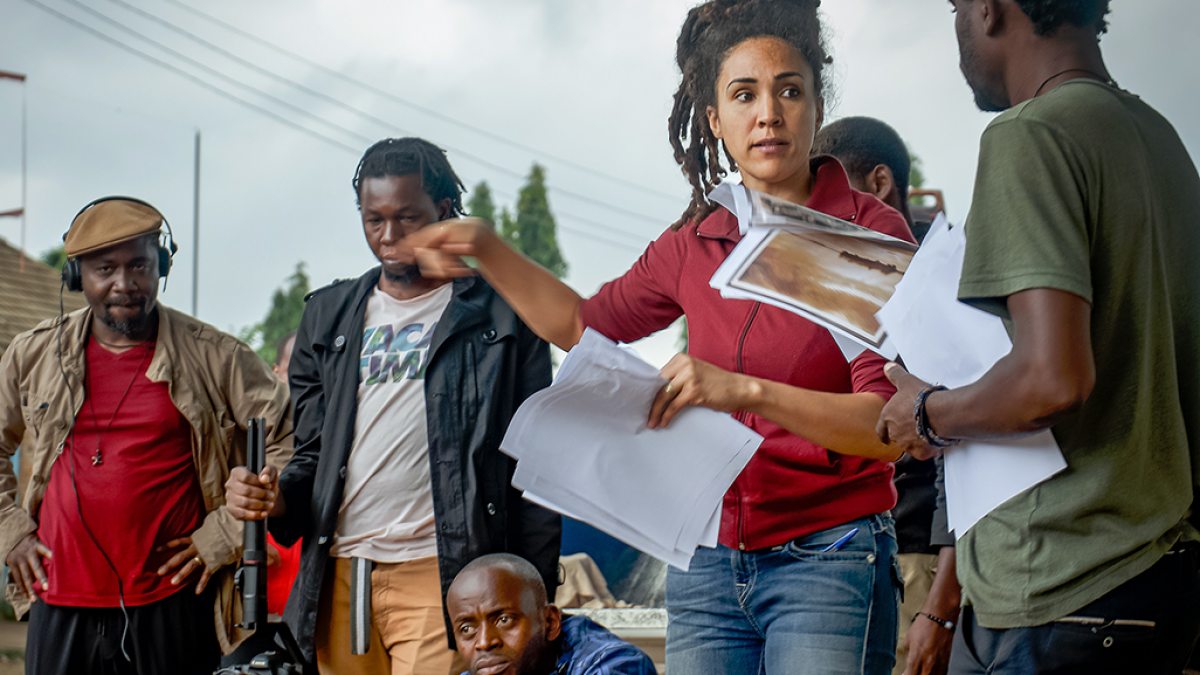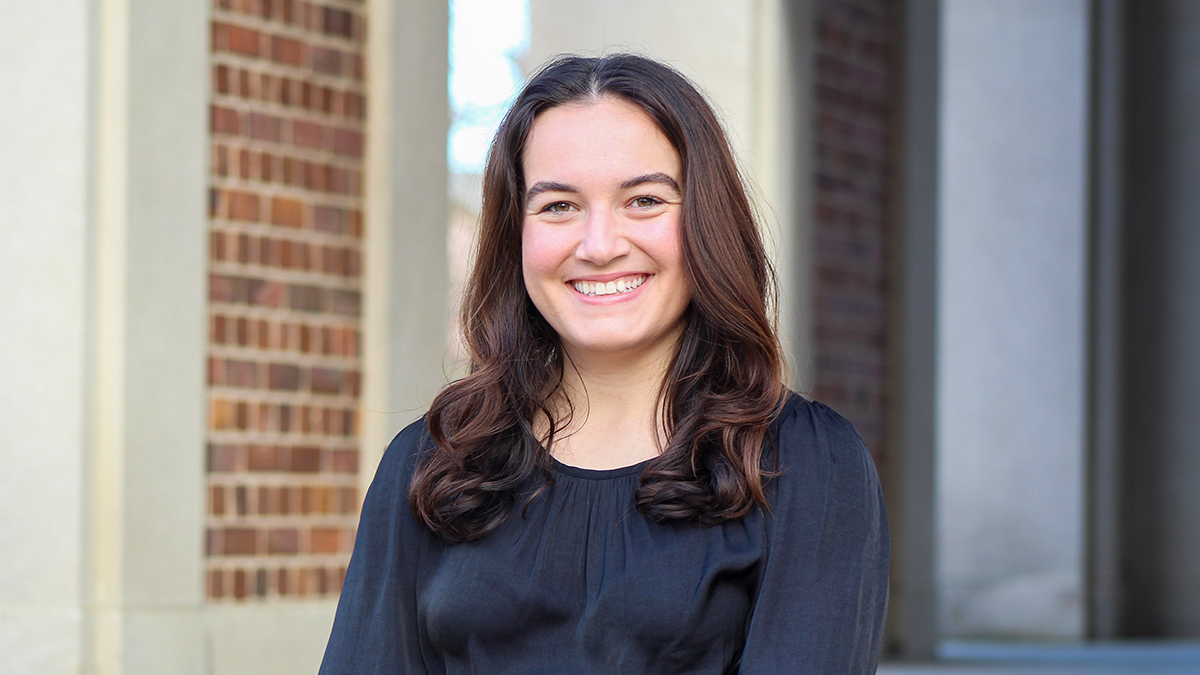Confronting conflict with creativity
From Chapel Hill to the Democratic Republic of Congo, music professor Chérie Rivers Ndaliko empowers students to come together and use creativity as a touchstone for social change.

Chérie Rivers Ndaliko stood behind the music stand she uses for a podium, her hands clasped, and looked out over her class.
“I’m going to stand up here, and I want you to tell me what you see,” she said. While she has completed this exercise with classes in South Africa, Brazil and across the United States, the answers are always different.
One student tentatively raised his hand. “Woman,” he said.
A few others, slightly less hesitant: Black. Intellectual. Confident.
“This isn’t a game of compliments, guys!” she laughed.
These descriptions say something about her, she said — and they also say something about the students in her class and the subconscious assumptions people make about others. Why do they see her as an intellectual? As confident? She launches into her exposé about human perception and how colonial photographers, in what is now the Democratic Republic of Congo, took advantage of this to portray the Congolese as primitive in the early 1900s.
“What do you think of the framing in this photograph?” she asked the class, gesturing to a sepia-tinted print of three Congolese women on the screen. Three hands shoot up. Ndaliko dances through the discussion with practiced ease.
An assistant professor in the College of Arts & Sciences’ Department of Music, Ndaliko studies the role of film, text, images and music on social justice in African war zones. Her work focuses on how African nations, particularly Congo, can use creative processes to fight against the disruption of war on a cultural front.
“It’s very important to me that, when we look at situations of conflict and crisis, we also look at creativity,” she said. “There is, institutionally, a history of divorcing one from the other and assigning the research that deals with resolving conflict to a certain set of disciplines. And those that look at creativity are typically not consulted.”
A different path
Ndaliko was born in Northern California but calls many places home. Ghana, Senegal, Denmark, Congo — her family was eclectic and wanted her to have connections to places that were important to them. She has been interested in social justice for as long as she can remember.
“I grew up in a world that said that half of my family is not as important as the other half. In a world where, when my parents got married, it was not recognized in a number of states,” she said.
Ndaliko’s mother is white and her father is black, and it became clear to her at an early age that there were structural inequalities in the world that she could not tolerate. A trained composer and pianist, Ndaliko turned to the arts as a way to work toward conflict resolution. She felt they were being overlooked in favor of routes that focused on the hard sciences — routes that she sees as not wholly effective.
“We all know that the definition of insanity is doing the same thing and expecting different results,” she said. “We’re addressing issues of inequity largely with the same strategies. I was curious to see where people are responding differently and what results they’re having.”
“Power in the guise of art”
Ndaliko has conducted research in Senegal, Mali, Kenya, South Africa and eventually Congo, a place that she became fascinated with while studying organizations that fought institutional inequities. She moved there in 2008 and continues to live in Goma, a city near the Rwandan border, for most of the year.
The city and much of eastern Congo has been a center of social and political upheaval since the first of two civil wars broke out in 1996. The area is rich in mineral resources such as coltan, an important component of many electronics, and industrial exploitation of the land by other countries such as the United States have fueled and funded the conflict.
Although the second war officially ended in 2003, cycles of violence and power struggles have kept the central African nation in a state of blistering unrest. While estimates vary greatly, Ndaliko said that roughly 8 million people have died as a result of the fighting. Millions more have been displaced and impoverished.
“It is the deadliest humanitarian conflict since the Second World War,” Ndaliko said.
The instability that comes from decades of strife has made an indelible mark on the country’s political and social climate. Many young people, for example, lack stable access to education, which limits their opportunities.
Out of this need came Yole!Africa, a Goma-based organization focused on promoting the arts in Congo. Founded in 2000 by acclaimed filmmaker Petna Ndaliko Katondolo, Yole!Africa was a major motivator for why Ndaliko decided to stay in Goma. She eventually married Ndaliko Katondolo.
“I was driven by a deep desire to learn to understand what is going on,” Ndaliko said. “And the more I learned about the unique history on Congo, the more committed I was to partnering with the people who were already doing such an extraordinary thing.”
In many East African languages, the word yolé means “come together.” It is used by cattle drivers, goat herders and shepherds to call flocks together when danger is afoot. Like those shepherds, Yole!Africa provides a place for Congolese youth to come together away from violence.
Yole!Africa encourages people to tell their stories in their own ways. The processes and skills that come from studying film, music, literature and other art forms help young Congolese adults find a voice to tell stories about their country in ways that reflect their experiences. The center works to provide them space, skills and education that may help them thrive in the war-torn region.
Ndaliko is the director of research and education at Yole!Africa for now — the organization is working to move away from hierarchical labels — and helps provide artistic classes, workshops and public events to 17,000 people of eastern Congo each year.
Through the nonprofit, Ndaliko advocates for a shift in the way the world handles humanitarian and charitable aid in Africa. The organization has struggled to find funding that doesn’t focus on the trauma that people have potentially endured, but rather on their successes.
“We have fought — and continue to fight — against reducing people to experiences of victimhood,” she said. “We don’t ask students to identify in those terms, as rape victims or child soldiers. If they identify as filmmakers, because that’s what they see themselves as, then we want to engage them as filmmakers, not victims.”
People who have completed courses at Yole!Africa have gone on to become politicians, human rights attorneys and journalists with media companies like BBC and Al Jazeera.
“I’m really proud of what we’ve done and what the students produce there,” Ndaliko said.
View more content for this story on Endeavors’ website.




